Yes, I’m talking about Massacre On Aisle 12 (2016 – read our review here) again. I can’t help it. This time, I’m talking to the film’s director, Jim Klock, who has just announced a new holiday horror film called Slayed, which was co-directed by him and Filmmaker Mike Capozzi. I was honored with the chance to chat with these two about Slayed, their passion for filmmaking, behind the scenes during Massacre on Aisle 12 filming, and more.
PopHorror: How did you guys meet?
Jim Klock: I met Mike many years ago through a friend of ours, another actor. I knew he was a filmmaker. He had done some other films I had seen for the 168 Festival. At the time I had met him, he was also taking head shots. Our friendship began after he took some headshots for me. I was in the middle of producing a couple of movies and I was like, “I need some new headshots.” And we just hit it off. I think it was 2012, Mike?
Mike Capozzi: Yeah, I think so. Actually, it might have been ’11 or ’12.
Jim Klock: And when he took my headshots, we had so much fun. We went and had lunch. Like a lot of people in the business, we were both just trying to find ways to create, and we just hit it off. We started working together and creating together.
PopHorror: Is this your first project together?
Jim Klock: Oh, no. We’ve been working together for years. We have a show that was on Funny Or Die—I don’t know whatever happened to that—but it was called “Interrogations Gone Wrong.” Keanu Reeves had guest starred on our show years ago after I did a movie with him. I think “Interrogations” was our first show, right, Mike?
Mike Capozzi: That was our first official show. That was 2013, the first time we were out there officially.

Jim Klock: And then Mike did Massacre On Aisle 12. I hired Mike as an actor in that. He’s been in a bunch of stuff that I’ve done as a producer, like shows for Hallmark… we’ve just created a ton of content together over the years. We have a little for our Code 3 family, and we’ve created a bunch of craziness there. Mike co-starred in Red Letters with me, which I directed. It just came out in August. And then that’s what led to us directing this one together.
PopHorror: Mike, you were in Massacre on Aisle 12?
Mike Capozzi: Yup! I was Pharms.
PopHorror: Oh! Hold on, I just have to fangirl for a minute.
Mike Capozzi: (laughs)
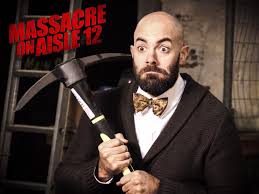
PopHorror: Okay, I’m done. Let’s talk about Slayed. Can you tell us a bit about what that film is about?
Jim Klock: Mike and I both love the classic horror films. The Texas Chainsaw Massacres were films that really impacted us. So we were trying to think of a way to make something that had that element, but at the same time, I’m a big fan of—like you, Tracy—of anything that’s got a Christmas theme to it. The Silent Nights, The Massacre on Aisle 12. When Chad Ridgely first sent that script—I oversaw that script—and it started out as 130-something pages. It was unproducible that way it was on such a low budget level.
But what I loved about it was the Christmas part, you know? So now, it was time to make more of the traditional Christmas horror, breaking away from horror comedy, yet still having some kind of Christmas theme. Mike had written the script, which was called Stealing Christmas, and it was more of a traditional Christmas comedy.
The summer of 2020—after Covid happened—started with us wanting to make that. But we couldn’t find this one character, and that led to me on the phone with a distributor saying, “I’d love to have a Christmas-themed horror film.” So then I wrote another film, and we were going to do that. And then I came to Virginia and a good buddy of mine said, “Hey, I have this place that you could shoot at.” He had access to a very unique set. So, I called up Mike, and I said, “I think we have two options. We can try to fit this movie I just wrote in July and try to fit it into this location, or I can take a stab at writing something new.” And so we decided, along with the rest of the Code 3 family, to try and write something new around this location.
When Mike and I work together, we do so much film study together, and we create so much together. It was really fun for me to write for the both of us. I usually have a pretty good gauge of what we both like to do and what we both have done, and then how I can write something that’s new for both of us. Mike, I sent you the treatment first, right?
Mike Capozzi: To this one, I think we just went straight through.
Jim Klock: I wrote an outline, remember?
Mike Capozzi: That’s the problem with going back to back. I can’t remember.
Jim Klock: (laughs)
Mike Capozzi: No, you’re right. You’re right.
Jim Klock: The only reason I remember is when I sent you the treatment, I asked you what you thought of the role I had written for you. What was cool, Tracy, was that I had written this treatment, and everybody on the team thought I was going to play one role, and I’m like, “No! No! I’m going to play the other!” It was just fun because I was trying to be a little sneaky with the roles so he and I could play some different characters.
The original title for Slayed was Christmas Eve-l. And it was really around this beautiful location that we had that then turned into, “What kind of Christmas theme could be there?” But at the same time, it’s a traditional stand alone horror. So there’s a Christmas element, but make so mistake, there’s that Jason Voorhees/Texas Chain Saw Massacre-type of killer that the movie’s based on.
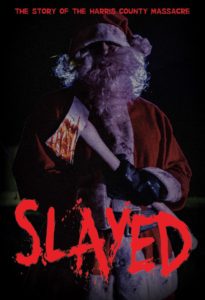
PopHorror: So, this is not a comedy horror then?
Jim Klock: No, this is a traditional horror. But both Mike and I—Mike, jump in if you agree—we both like horror movies that include that additional element of humor. And this has that.
PopHorror: Even Texas Chain Saw Massacre had these little moments when you’d come out of it like, “Oh, hey. That was actually funny.”
Jim Klock: Exactly! Even with that great actor that just passed away, the former Marine, R Lee Ermey. The one that he did. Mike, every time that he was on screen, he was trying to be funny.
Mike Capozzi: Oh, yeah. There’s no true comic relief characters, but there’s definitely moments of comedic elements or things said like with R. Lee Ermey. It had comedic elements that all the classic horror films have. There’s always some bits of humor in there to lighten the moment just before that great scare happens.
PopHorror: How far have you guys gotten as far as production on Slayed? I can’t imagine it’s easy to do right now.
Mike Capozzi: Oh, we’re wrapped. We’re a few weeks in post.
Jim Klock:: We shot ten days in Virginia. We had a very solid Covid plan. We followed all the guidelines here in Virginia. We all quarantined together for the 10 days. We never had more than ten people on set at a time, between cast and crew. Right, Mike? Ten?
Mike Capozzi: Yeah!
Jim Klock: And what we did was, we hired actors that we knew and liked a lot and knew they would be great, but could also handle wearing other hats for it. So it was this really—to be honest with you—this really sort of summer camp vibe. Hard work, no two ways about it. But it was one of the most enjoyable experiences I’ve ever had as a filmmaker. Everybody just doing what needed to get done. Everybody chipping in. Really respecting each other, being conscious of the times that we’re in. It was awesome.
Mike Capozzi: I think the reason why we moved so quickly was because it’s such a fine tuned machine at this point. Between us working together for so long and the whole Code 3 Films family, to be able to move that quickly, it’s just something that we’ve been doing for so many years.
We worked with Gary Austin, who’s the founder of the Groundlings Improv, and we used to be all baseball all the time, and Jim and I would bond over that as well. But we said there’s a reason these guys can hit 90 MPH fastballs, and that’s because they’re doing it every single day, and that’s why it looks easy for them. And that’s pretty much, from morning until night, that’s what we do. Filmmaking. All different aspects of it.
Jim Klock: You know, Tracy, one of the things in this stage in my career—I feel very blessed across the board as an actor and producer and just a filmmaker—is that I have this saying: “Writers write, directors direct, actors act, producers produce. And everyone else just talks about it.” What most people don’t know is, if you’ve seen a sketch that Mike and I have done, and it could be the most ridiculous sketch for our Code 3 family side, and they could be absolutely ridiculous. But what most people don’t know is that Mike and I don’t want to attack it with a ridiculous attitude. We attack it the same way we do with everything else. So, as an actors… let’s say I’m acting in a low budget horror film or I’m acting in a Peter Farrelly movie, I don’t change. I prepare the same way.
What ends up happening is, over the years, you’re constantly creating, which means we’re constantly in the script writing or the developing stage. We’re constantly shooting; we’re constantly editing. And the skills you use for a five minute sketch… the skills don’t change. The only thing that changes is, when you make a feature film, you might have more people, longer days and a little bit more money, but the basic skill set does not change. I’ve got to make sure I’ve got a well-developed piece of material; I’ve got to hopefully hire the right people.
And then you get into post. And anyone will tell you, post is not for the faint of heart. Post, from the day you get it in the can to when you’re ready for delivery, that’s what separates the professionals from the novices. It’s the truth. That’s what it is. It’s the ability to say, “I’m not going to give up. I’m not going to quit.” Because the excitement goes away. You start with all the actors who want to be involved, and all of the people who want to be involved, and you’re left with you and two friends trying to figure out how to get this piece of art finalized and special.
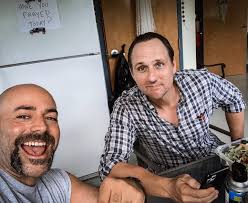
Mike and I have been doing things on our sketch side, and Darrell Martinelli and I have been together from Code 3 for so many years. It’s not the movie that you know me for. It’s all the movies that we did before that are paying dividends now. So, when Mike talks about the well-oiled machine, that’s exactly right. It’s the years of us doing it together. It’s the years of understanding each other.
This movie didn’t exist August 1st. I hadn’t even seen the location. The movie didn’t exist, but then the movie was shot and in the can on August 25th. And that’s by the grace of God, number 1, that I have this amazing team of people around me who come together with a common goal and the same agenda. That agenda is: Let’s be good to one another, and let’s try to make a good movie, something we all love to do. It’s not about being famous. It’s not about somebody getting more attention. Simply, the agenda is that we all love this. We love making horror films. We love acting and producing. We love working on things together. That’s it. It’s the simple. When those agendas and arrogance and pride goes away, and the real agenda is set, good things happen. Wouldn’t you agree, Mike?
Mike Capozzi: Oh, yeah. Absolutely.
PopHorror: It’s like the grassroots feeling of working together that you lose the bigger the production. Even indie filmmakers tend to lose that when they get bigger, more popular. Then they’re dumped into even bigger places with more attitudes and ego. You lose that feeling of camaraderie,
JJim Klock: You do. And it’s really easy to happen. I’ve seen it happen. I have people like Mike and my wife [Marci Klock], my accountability partners. The reason is, in our business, it’s really easy to get caught up in ourselves. It doesn’t take much. You start to get a little success, and all of a sudden, you’re all focused on what’s next for you that you forget that grassroots, just like you just said. You forget, “Why did I get into this?” I know I didn’t get into this to be famous. I didn’t get into it to be rich. I got into it because I loved it, and I know Mike can say the same thing.

And then, over time, what happens is, people on the outside of our business, they’re like, “Oh, have you made it yet? What are you making next?” Here’s what I’ve learned about making it. There is no making it. Here’s the beauty of being an artist. I run a race that I will never finish. That’s a fact. Like Clint Eastwood would say when asked, “What’s your favorite movie?” “My next one.”
The grassroots of it is making sure you’re around like-minded people. That’s what I’ve learned. That’s the most important thing. I can deal with everything else. But it’s when one person who has a different agenda can truly destroy the element of what is special about the movie. One person who puts whatever they want as more important to the team. And that’s what you have to be careful of. Mike has seen this a lot.
I’ve been doing this for 20 years now on all different levels. What you end up doing is building a Rolodex of people and the relationships that you make. And then people come along, and they want those relationships. And you’re in a place where, if you’ve got a generous heart and you want to help other people live their dreams and make their movies, then you open yourself up to that. But sometimes, as the old saying goes, you’re going to catch some frogs. You’re going to get wronged. People are going to do you wrong. They’re going to take your relationship, and they’re not going to value the thing.
But what can happen is, you could just hold onto that. You become so disappointed that you stop being generous. Or you stop creating. Or you stop giving some new actor or writer or director a chance. Well, guess what? The whole idea of why we got into this is gone. The whole idea of creating and being around people who love movies, and being on the phone with you, Tracy, who loves horror and writes about horror, that goes away because it becomes about me. Me, me, me. I mean, I get it. It can happen quick. But Mike can tell you, I ask him all the time—hold me accountable. I think that’s important for us.
And that’s one thing I love about our Code 3 family is that we open up the discussion. Some days are hard, and we might disagree on certain things, but we all know what we have a common goal. That common goal is to love one another when we start, and love one another when we finish, no matter what the results are. Great movie, that’s wonderful. Okay movie, nothing can take away the experience. That’s the grassroots. That’s exactly right. Why we got started, and what’s important to us as we’re going through the process.
PopHorror: So it’s more about the journey.
Jim Klock: Yes. Because no one can take it away from us. That’s the thing. I’ve made good movies and I’ve made okay movies. I’ve done eight movies you’ll never see (laughs). Mike and I, we’ve made sketches that people love, and we’ve made sketches that 300 people have seen. Some of the ones that have been the least amount seen, those are our favorites because people weren’t there to know what was so special about them. Something crazy happened that night. A reference to Mike’s dad. A reference to Gary Austen. A reference to Jack Plotnick. People who’ve been good to us and breath life into us. And that makes that sketch really special. But the audience doesn’t always relate.
The thing about Massacre on Aisle 12 is that it’s a fun movie, but a lot of people don’t know about the inner workings. It was a tough movie. It was a tough shoot. It had elements. It had a lot of things that we needed to go right. And, if Mark McCullough, who co-directed with me, had not found that amazing warehouse. I said many times—Mike, correct me if I’m wrong here—but I told Chad [Ridgely] many times that we could not greenlight the movie until we had a location.

Mike Capozzi: (laughs) Yup!
Jim Klock: And we had a location in New Jersey. It was an Ace Hardware that backed out after they read the script. But then Mark McCullough found that place in Savannah, Georgia, and what you can never take away from that project, Tracy, is that God had shined down on us and Mark had found that beautiful location that was already perfect. All of that stuff, it was already in there. We didn’t set dress one thing. If that didn’t happen, there would have been no Massacre.
My relationship with Mark goes back 22 years. He was in the very first feature film that I ever produced. That’s relationship capital. That’s how long that relationship goes back. Those are the type of things that, when the movie comes out, they don’t know about these fine moments that had to happen for the movie to get made. Mark is one of the nicest guys you’ll ever meet. He just befriends people and he has all kinds of contacts. And he called me up one day and he said, “I think I’ve got a hardware store.” And Mr. Chen, who owned it at the time, was the nicest man. And we had it for two weeks from 6 at night until 6 in the morning.
https://www.youtube.com/watch?v=zf_zZU0uS0M
PopHorror: I actually talked to Chad [Ridgely – read the PopHorror interview here] about the location. He said there was someone living in the store while you guys were filming, and no one knew he was there.
Jim Klock: He had rented out… the way the hardware store was built, it was odd. It was in this old, old building that had been a hotel at one time. Right, Mike?
Mike Capozzi: Yeah, like back in the ’30s or something.
Jim Klock: So there was this weird, secret, upstairs room that we didn’t know was rented, until, like, the second week. Right, Mike?
Mike Capozzi: Yeah. We were in the second week of shooting, and some guy just walked in.
Jim Klock: (laughs) Yeah, it was a very odd place. But you talk to any filmmaker, people who have been doing it for a long time, and they’ll tell you. The location is the key if you’re trying to make a movie with no money. And Mr. Chen provided us with the opportunity. I don’t care what Chad or anyone else says. That movie would not have happened if Mark McCullough had not found that place. That’s a fact.
PopHorror: The location becomes its own character.
Jim Klock: And wasn’t it a character? It couldn’t have been better for that movie. And the elevator, where Mr. Kipper dies. Where else would we have ever found an old hardware store that had a crankshaft elevator? Chad had produced a feature film. He had this script, and it was a good idea. But the opening of that original script was like a $10 million movie! (laughs) Things were blowing up and cop cars were crashing through the windows. But what was fun, by the time we were done, is that everyone had a good feeling about it. I spent, what, nine months with Chad? Nine months overseeing the script development, getting the script to be toned down so we could actually shoot it with a low budget.
But when you go through that, you realize… there’s two ways to fix a problem when you’re making a movie. It doesn’t matter who you are. Tarantino or anyone else. You can either fix the problem with money or creativity. You can either throw money at a problem, or you could try and fix it creatively. And what I loved about Massacre and developing that with Chad is toning that down to get it ready. I love that process. Hey, we don’t have a lot of money, so how can we creatively figure out how to make this a fun movie, and still keep the ethics of the story within what budget we have?
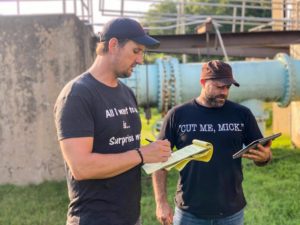
And so then you fast forward, and I’ve made several films since then, you get to the point like with Slayed, Mike and I and Darrell, when they sent me back some notes to write the script, I didn’t feel like I was trying to turn a square peg into a round hole. I actually felt like I had a round peg and it was going to fit perfectly in the round hole. And that’s the difference of adapting a story down, or taking a story and trying to make it fit, versus in this situation, where we developed this story to fit into what we had. And it really was fun, but it also had a little bit more of a creative life in it.
Because every day, we would go to set, and we would have a bigger vision, if that makes sense. We would see things, and they would change for the better. Instead of changing into what I didn’t have, we were changing to what we did have. And I think that was really special about this. Does that make sense? The difference between toning down and starting from a nice place. Mike had an amazing thought on the last day of shooting for this shot, and it was just beautiful, perfect magic. That doesn’t tend to happen when you’re constantly trying to push a product down, if that makes sense.
PopHorror: I totally get it. If you have an idea of what you want already, you can almost put blinders on and go towards that direction. But if you go into it like, “Well, what can we do today? Let’s do this. We found this.” And you’re creativity just blossoms and you’re able to create so much more than you thought you ever could have.
Jim Klock: Absolutely! Mike, she hit it on the head, didn’t she? That’s exactly how every day was on set, Tracy. Every day was like, “Oh, my gosh! This place is amazing. What else can we do?” Mike, how many days, on that entire shoot, did we actually change our entire theme because our vision was broader? Because of what you just said. The dock. We were never supposed to shoot this entire part of the movie out on this beautiful dock in the water, but we did, because of exactly what you just said. You start your day with, “Oh, my goodness! What else can we do?” Not, “Oh, my goodness, we can’t do that, so how do it with what we have?”
Mike Capozzi: It’s a totally different mindset. It really is.
Jim Klock: The freedom that comes from that. I felt like this movie—Mike, feel free to chime in—but I felt like this movie was different as a filmmaker. I mean, also, I’m there with my friends. But I really felt like we all had the lens of what was the right answer.
Mike Capozzi: Yeah. I agree.
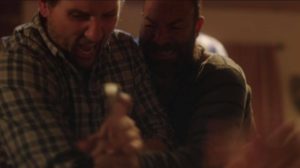
PopHorror: Speaking of Slayed, can you tell us who else was involved in the making of the movie?
Jim Klock: The movie is produced by my company, Code 3, and my long time partner, Darrel Martinelli, who was also a producer on Massacre On Aisle 12. Emily Adams is our DP and a producer as well. Me, Mike, Darrell and Emily are the main Code 3 family, if you will, when it comes to getting the project together and greenlighting it. It’s the second film in the three picture deal I have with Terror Films, with Red Letters being the first one.
On top of that, we have co-star Kyra Kennedy, who was also in Red Letters with Mike and I. She’s a New York actress who’s been on Broadway and the TV series, Blue Bloods. She’s a really talented singer/songwriter/actress. Then there’s Coel Mahal. She’s also an amazing actress who had been in a bunch of stuff with Mike and I and our Code 3 comedy side. We have a couple newcomers. We have Delton Goodrum, which is a good story. Delton was a police officer with me in Alexandria, Virginia, many years ago. He’s still a police officer. He’s a lieutenant now. I wrote this part for him. We were on the Defensive Tactics Instructor team together. I knew I needed a big guy who could do this with me, and he was wonderful. Another newcomer is Actor Chuck Roberts. Great guy.
There’s also an executive producer named Phil Snow, who’s a buddy of mine. He’s also a filmmaker from Virginia who has done a ton of stuff at the high schools with students who are interested in making films. We became buddies. We just had a really tight crew, and my Code 3 family. We had Chris Hubbart, who’s been with me for many, many years, who helped us out with our props and special effects and set designs.
Then there’s Jojo Draven, who’s our music composer. She does our scores. She’s been with me for years. She’s amazing. Her husband, Danny Draven, is our editor. He’s an incredible horror film director. You probably know Danny Draven from Weedjies and Patient Seven which I produced. Danny is our editor, and he’s also an executive producer. He also came on board to help oversee our post to get this really elevated. I was really excited to have Danny on board. We love Danny. He’s a great director. He’s a great filmmaker. To be honest with you, Tracy, he’s just a better person. Him and Jojo are one hell of a team that we love to have.
Mike Capozzi: Oh, and there’s Sergei Dmitriev, the second unit director.
Jim Klock: Yes! That’s right. Sergei has also worked in special effects with Coel. Coel not only starred in the movie, but she was also our special effects supervisor. Her and Sergei did all of our special effects. Sergei was absolutely amazing as the second unit director. Sheriff DP [Brittany] Decatur and Captain Lee Peters from the Sheriff’s office were incredible support staff. They were great at assisting with everything we needed to shoot here in Virginia. My beautiful wife, Marci, got her first producing credit. My son, Brendan [Mullins], was our KPA. That’s about it! (laughs)
Mike Capozzi: You know what? We had an amazing sound mixer, Eric Heinzman. We have to give a shout out to Eric.
Jim Klock: Oh my gosh! How did I forget about Heinzman? That kid’s great. This is his first feature film, Tracy, and this kid fit our family like a glove. I’ll tell you a funny story. In Red Letters, our post-sound designer had said to us, “Hey, make sure you get some really good foley for us.” So Mike and I spent a day in this warehouse creating foley to send to the sound designer. And, this kid… what is he, like 23?
Mike Capozzi: He’s young. Yeah. He just started his Masters, I believe?
Jim Klock: He moved from Pennsylvania to North Carolina because his girlfriend is getting her Doctorate at Duke, I believe. So he comes up on his first feature, and he just has the best attitude ever. He’s just great. So about six days in, he comes up to me and he says, “Hey, Jim. Is there a way that I can get a little extra expenses? I want to go to the grocery story and get some meat.” And I’m like, “Meat? Do you want to have a barbecue? I’ll pay for a barbecue.” He’s like, “Oh, no. I want to get all this meat so I can get foley of me stabbing it with all the different things, and I want to be able to hear what it sounds like for a knife to go into a piece of kobe beef.”
(all laugh)
PopHorror: Talk about dedication!
Jim Klock: Yeah, real dedication! So $67 later, the kid’s taking an ax into chicken and he’s slicing beef jerky for the sound of the skin. It was just awesome. This kid, I’ll take everywhere. He was perfect. My wife loved him. Everyone loved him. He was just so excited to be there every day. We couldn’t have been more blessed.
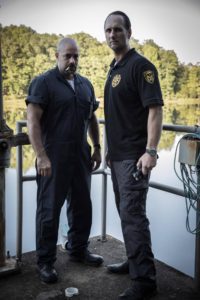
PopHorror: That’s awesome! So I’m going to ask you guys the same questions you’ve probably been asked in every interview you’ve ever done. What’s your favorite horror movie?
Jim Klock: Go ahead, Mike.
(all laugh)
Mike Capozzi: Of all time? You know what? I’m going to say this, and I’ve only seen it once in the theater, and I’ll never watch it again, because it scared me to this day. I hope it holds up. Event Horizon. It scared me for life. I will never watch it again.
Jim Klock: I remember him telling me that, actually.
PopHorror: I usually get some obvious answer like Friday the 13th.
(all laugh)
Mike Capozzi: I’ll never watch it again. I don’t care.
Jim Klock: Tracy, he’s not kidding you. He’s been telling me that for years. We always do film studies together at our theater in LA, and he won’t watch it. So I haven’t seen it. That’s the absolute truth, what he’s telling you.
I’m Strangers. I love The Strangers. That one, I’ll never forget, with Liv Tyler washing dishes with that shot down the hallway with that person just standing there for like 30 seconds. I saw that in the theater, and you could feel that element of fear throughout the whole theater. So, mine’s Strangers.
PopHorror: “Because you were home…”
Jim Klock: Yeah! You know what the sad thing is about that, Tracy? After being a policeman for many years, that’s the truth. I can’t tell you how many times we heard that. You’d get a suspect and they would do some horrible crime, and we’d say, “Well, why’d you choose them?” “Because they were home.”
(a beat of silence)
PopHorror: Wow! That’s terrifying!
Jim Klock: I know! But yeah, that movie was great. Plus, I love Liv Tyler. I think she’s an incredible actor, and I just thought she was amazing.
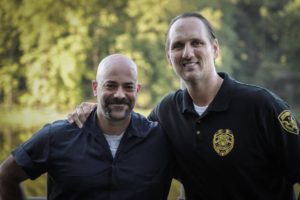
PopHorror: What are your characters like in the movie?
Jim Klock: Character-wise, they ended up being something very fun for us, because they were different from our standard characters. Anything about playing Crandle, Mike?
Mike Capozzi: Yeah, when we were discussing it early on, we were talking about getting to do things we like, and we get to write things for ourselves. And these were characters that we had never done before. When Jim’s writing, he definitely wrote to my strengths. I like to be silent, as you may have noticed.
(all laugh)
Mike Capozzi: Not many words come out of my mouth. That’s also being protective of myself, because I’m an improviser. I just speak too much. However, I got to really work on that with Crandle. Any word that came out of his mouth was very specific and for a reason. It was a lot of fun to be silent. Just enjoying my time on screen, talking with my eyes. Any actor I enjoy watching is usually because they’re saying it with their eyes and not with their mouths. So it was nice to be able to do that.
Jim Klock: That’s one of the fun things that happen when you keep working and you keep getting opportunities. The many lessons of Code 3. I created Code 3 many, many years ago. Early in my career, I put money in my equipment, and Darrell and I would just go and make anything we could make. What happens is, you constantly get to explore without waiting for someone to hire you to do so. That’s the thing that makes so many actors frustrated, and it is a frustrating thing. When you’re constantly waiting for someone to hire you to go play a part or create something.
For me, writing Crandle for Mike… which was funny, because everyone thought that I was going to play the Crandle part. On the page, it was a little bit more in line with what I had done. But, what I got to do was flip it. So, writing Crandle for Mike, writing to his strengths helped him to be very present and command the screen with his presence, without speaking, which is something I’m also a fan of. But I got to write a character for me that is unique, too. He’s not what you think.
When you get to a place where you constantly have the opportunity with your team explore ways to make movies and do what we all love to do, and then at the same time, not be concerned with any of the outside noise… I want people to enjoy the movies, obviously, but I’m not all that concerned with what someone thinks. As an example, a very good friend of mine asked me after I had just come off of Green Book, “Why do you make these little movies?” I just had to laugh to myself. People who use the terms “big movies” and “little movies” are people who don’t make movies. We all know how much work goes into all of them. You hear people like Tarantino talk about that all the time. He’ll talk about how much respect he has for different filmmakers that no one knows, because they’re just out there grinding.
Mike and I have worked so much together. We always have. I’m Dean [Martin] to his Jerry [Lewis]. That comes from a place of not only friendship but also the absolute blessing of getting to write for each other’s strengths, but also, write in a way that makes us excited about these characters. I knew Mike would be excited about his character, just like I knew he was going to be excited about Red Letters. They were different, but I just knew it. When I first signed on to do Massacre, I just knew Pharms was him. The best thing he did with Pharms—I’ll never forget it—when I first told him he was going to play this character, he came out with the white doctor’s coat and a bow tie. And I’m like, “That’s Pharms.” It was never in the script. He was never written that way. But that’s Pharms.
So that’s probably the most exciting thing for me from this is… well, the directing together was really fun, and it was nice for Mike to get to direct his first feature. He really grabbed ahold of everything. I said, “If you’re going to do a feature, you’ve got a whole lot more on your shoulders.” It’s a lot more than most people think about. People will say, “Oh, well, I want to direct movies.” And I’ll say, “Well, what do you think would make you a good director?” And they say, “I like talking to actors.” Well, there’s a lot more to it than that. In fact, that’s only about 5% of what directors do.
So, just seeing him step up and see this thing all the way through, even in post, was so great. There’s nothing like being with your friends and watching them get excited, whether it’s Darrell and Emily, when I watch them get excited behind that camera, or whether it’s watching my wife get excited over making up bloody stab wounds. Or whether it’s Mike and I when we’re playing these characters of Jordan and Crandle. When we can say, “Hey, we’ve never gotten to do this before. In 20 years of doing this, we’ve never played these characters.” How freaking amazing is that?
What else do I need? Do I hope I make a lot of money so I can keep making movies? Really, outside of that, what else do I need?

PopHorror: Okay, so we’ve talked about movies. Let’s talk about what really scares you. What are you really afraid of?
Jim Klock: Mike?
Mike Capozzi: Girls.
(all laugh)
Mike Capozzi: Girls, bees, and needles.
Jim Klock: For me, I don’t like anything having to do with exorcism and any of that type of stuff. Possession-type films… you know, its funny. Anything that’s a real type of threat, something I can see or be able to defend myself against doesn’t scare me as much as something I can’t see. Possessions… and then snakes.
Mike Capozzi: (laughs)
Jim Klock: I would have passed on Snakes On A Plane. Hey, Sam Jackson. I love you, but I’m not gonna go near that.
(all laugh)
Jim Klock: They had real snakes on that film.
*cue discussion on how a snake was trapped in the copy machine at the PH writer’s library job*
Jim Klock: Oh, no. There would be no more library. There definitely wouldn’t be any more copy machine!
(all laugh)
Jim Klock: When I was a rookie—I’ll never forget this—I was in what’s called Field Training Officers, FTO. You have to go through FTO before you can be released on the streets. We went to a domestic, and a guy came out of the domestic situation, and he was threatening me with this snake is his hands. To me, I’m 21 years-old, and it looks like it’s a King Cobra. I’ve got my gun out, and I’m like, “You better drop that snake, or I’m gonna shoot you! You better put that snake down!”
(all laugh)
Jim Klock: And my training officer, who’s been on the force for like 24 years, he’s like, “Okay, that’s enough. What are you gonna do, shoot him? Tell me how you can justify using your gun on this guy.” And I said, “Well, it’s a snake! It could be venomous! He could have thrown it at me!” Of course, I’m trying to back peddle now. He’s like, “No. No.” And the thing ended up being like a foot long, something he had just bought from the pet store. But it scared the hell out of me.
PopHorror: You never know! Even the little ones bite.
Jim Klock: They do! That was my point, Tracy. My life was in danger. This guy was trying to throw a snake at me.
(all laugh)
PopHorror: If he had walked out with a tiger, you would have been like, “Meh.”
Jim Klock: But of course, with my luck, it was a snake. But that’s my two choices: possessions and snakes. Do you guys remember a movie from back in… I don’t know, we all must have been pretty young. It was a movie about a Black Mamba?
Mike Capozzi: Hmmm. No.
PopHorror: No.
Jim Klock: It was a Lifetime movie before there were Lifetime movies. I watched it with my dad. This guy wanted to kill his wife, and he left for the weekend, so he had ordered a Black Mamba from Africa and he left it in the house. The whole movie is her going through her daily routine, and we’re following the Black Mamba as it watches her. Every time she opens a door, you can see the Black Mamba is right behind the dryer or whatever. It was crazy. That’s probably why I’m so afraid of them! I blame it on my dad.
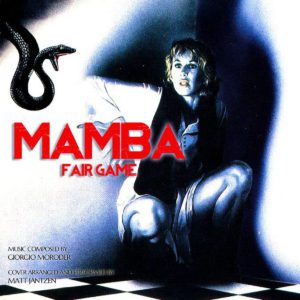
PopHorror: Did it get her?
Jim Klock: I can’t remember. I probably left halfway through.
PopHorror: Now you need to go look it up!
Jim Klock: Exactly. Thanks a lot, Tracy.
(all laugh)
PopHorror: Goodnight, Jim. Sweet dreams!
(all laugh)
Mike Capozzi: I would like to keep talking about snakes.
(all laugh)
Jim Klock: That is a movie we will not be making! But you know what’s funny, is in pre-production, I was in the office and they went out this shed where they find a body during the movie, so they went out to prep it. When Darrell raised the garage door, a snake fell down onto his shoulders.
(all laugh)
Jim Klock: So I end up calling Sheriff Decatur who called Captain Mike Knoll, who’s the head of Animal Control. Mike and one of his guys come out and they do a complete snake sweep of the entire property the day before we started shooting.
PopHorror: Did they find any more?
Jim Klock: They found that same snake, but that was the only one. It was a smaller snake, non-venomous and known for those type of areas. But other than that, they didn’t find any other evidence of snakes anywhere else on the property. Thank God. So Bear Grylls isn’t the only one out there who’s got connections. Ol’ Jim Klock has a few friends as well.

We want to send a great big thank you out to Jim Klock and Mike Capozzi for taking the time to talk to us. Stay tuned to PopHorror for updates on Slayed as well as an upcoming review!
 PopHorror Let's Get Scared
PopHorror Let's Get Scared



